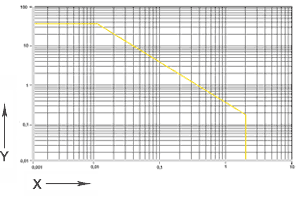The iglidur® J bearings are characterized most notably by their extremely low coefficients of friction in dry operation and very low stick-slip effect.
iglidur® J - Material data
| Genera l features | Unit | iglidur® J | test method |
| Density | g/cm³ | 1,49 | |
| Colour | yellow | ||
| Max. humidity absorption at 23°C/50% R. H. | % weight | 0,3 | DIN 53495 |
| Max. water absorption | % weight | 1,3 | |
| Coefficient of surface friction, dynamic, against steel | µ | 0,06 - 0,18 | |
| pv values (dry) | MPa x m/s | 0,34 | |
Mechanical properties |
|||
| Bending E-module | MPa | 2.400 | DIN 53457 |
| Tensile strength at +20 °C | MPa | 73 | DIN 53452 |
| compressive strength | MPa | 60 | |
| Maximum recommended surface pressure (20° C) | MPa | 35 | |
| Shore D-hardness | 74 | DIN 53505 | |
Physical and thermal properties |
|||
| Max. long term application temperature | °C | +90 | |
| Max. short term application temperature | °C | +120 | |
| Minimum application temperature | °C | -50 | |
| thermal / heat conductivity | [W/m x K] | 0,25 | ASTM C 177 |
| Coefficient of thermal expansion (at 23° C) | [K-1 x 10-5] | 10 | DIN 53752 |
Electrical properties |
|||
| Specific forward resistance | Ωcm | > 1013 | DIN IEC 93 |
| surface resistance | Ω | > 1012 | DIN 53482 |
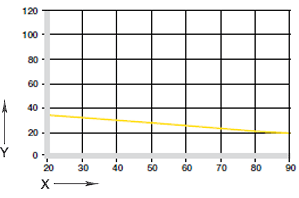
Figure 02: Maximum recommended surface pressure dependent on the temperature (35 MPa to +20 °C)
X = Temperature [°C]
Y = Load [MPa]
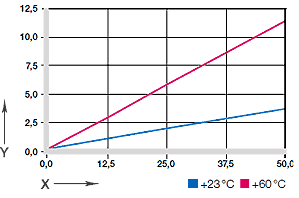
Figure 03: Deformation under load and temperatures
X = Load [MPa]
Y = Deformation [%]
The pressure resistance of iglidur® J plain bearings declines with increasing temperatures. Fig. 02 clarifies this connection. With the long-term permitted application temperature of +90°C, the permitted surface pressure still amounts to 20 MPa. Maximum recommended surface pressure represents a mechanical material parameter. Tribological conclusions cannot be drawn from it.
With a maximum recommended surface pressure of 35 MPa, the iglidur® J bearings are not suitable for extreme loads. The Fig. 03 shows the elastic deformation of iglidur® J with radial loads.
| m/s | Rotary | oscillating | Linear |
| Constant | 1,5 | 1,1 | 8 |
| Short-term | 3 | 2,1 | 10 |
Table 02: Maximum surface speeds
The low coefficients of friction and the very low stick-slip effect of iglidur® J bearings are particularly important in very low speeds. iglidur® J can also be used however for speeds above 1 m/s. In both cases the static friction is very low and stick-slip is completely absent. The maximum values stated in the Table 02 can be attained only with minimum pressure loads. The stated values show the speed at which the temperature rises according to friction to the highest permitted value.
| iglidur® J | Operating temperature |
| Lower | - 50 °C |
| Upper, long-term | + 90 °C |
| Upper, short-term | + 120 °C |
| Secure axially in addition | + 60 °C |
Table 03: Temperature limits for iglidur® J
The iglidur® J bearings are usable between -50° C and +90° C; the short-term permitted maximum temperature is 120° C. Above +80°C the wear increases extremely. An additional securing is recommended at temperatures higher than +60°C.
| iglidur® J | Dry | Grease | Oil | Water |
| Coefficients of friction µ | 0,06 - 0,18 | 0,09 | 0,04 | 0,04 |
Table 04: Coefficients of friction for iglidur® J against steel (Ra = 1 μm, 50 HRC)
Just like the wear resistance, the coefficient of friction µ also alters with the load (Fig. 04 and 05).
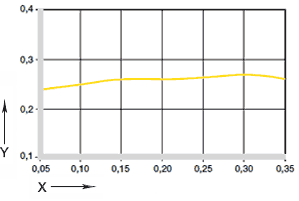
Figure 04: Coefficients of friction dependent on the surface speed, p = 0.75 MPa
X = Surface speed [m/s]
Y = Coefficient of friction μ
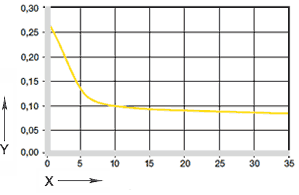
Figure 05: Coefficients of friction dependent on the load, v = 0,01 m/s
X = Load [MPa]
Y = Coefficient of friction μ
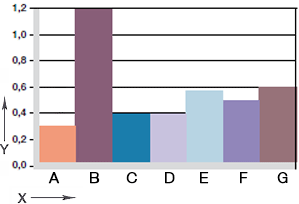
Figure 06: Wear, rotating application with different shaft materials, p = 1 MPa, v = 0.3 m/s
X = shaft materials
Y = wear [μm/km]
A = Aluminum, hard anodized
B = machining steel
C = Cf53
D = Cf53, hard chrome-plated
E = St37
F = V2A
G = X90
Friction and wear also depend to a high degree on the reverse partner. With increasing shaft coarseness the coefficient of friction of the pairing too rises. The best suited is a smoothed surface with an average surface finish of Ra = 0.1 to 0.3 µm. Figures 06 and 07 display a summary of the results of tests with different shaft materials conducted with iglidur® J plain bearings. Compared to the most other iglidur® materials, the wear of iglidur® J plain bearings with low loads is extremely low with all tested shaft materials. The wear resistance of iglidur® J bearings is exceptional even with rising loads in the range of up to 5 MPa. Please contact us in case the shaft material scheduled by you is not included here.
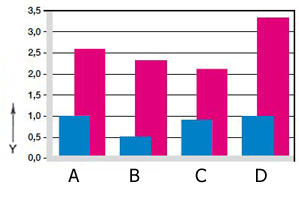
Figure 07: Wear in pivoting and rotating applications with various shaft materials, p = 2 MPa
Y = wear [μm/km]
A = Cf53
B = hard chrome-plated
C = V2A
D = St37
E = rotating
F = oscillating
| Medium | Resistance |
| Alcohols | + |
| Hydrocarbons | + |
| Greases, oils without additives | + |
| Fuels | + |
| Diluted acids | 0 to - |
| Strong acids | - |
| Diluted bases | + |
| Strong bases | + to 0 |
All specifications at room temperature[+20 °C]
Table 05: Chemical resistance of iglidur®
Electrical properties iglidur® J bearings are electrically insulating.
| Specific forward resistance | > 1013 Ωcm |
| Surface resistance | > 1012 Ω |
chemical resistance
iglidur® J bearings are resistant to diluted alkalis and very weak acids as well as to fuels and all kinds of lubricants. The low humidity absorption allows them to be used in wet or humid environment. The bearings made of iglidur® J are resistant to common cleaning agents used in the food industry.
Radioactive rays
The iglidur® J bearings are radiation resistant up to a radiation intensity of 3 • 102 Gy.
UV-resistantiglidur® J bearings change color under the influence of UV rays. However, the material properties do not change.
VacuumIn vacuum, iglidur® J plain bearings degases. For this reason only dry bearings are suitable for vacuum.
| by +23 °C/50 % r. F. | 0,3 weight-% |
| Max. water absorption | 1,3 weight-% |
Table 06: Moisture absorption of iglidur® J
The humidity absorption of iglidur® J bearings amounts to about 0,3% in standard climatic conditions. The saturation limit in water is 1,3 %. These values are so low that a moisture expansion need to be considered only in extreme cases.
| Diameter d1 [mm] |
Shaft h9 [mm] |
iglidur® J E10 [mm] |
Housing H7 [mm] |
| Up to 3 | 0 - 0,025 | +0,014 +0,054 | 0 +0,010 |
| > 3 bis 6 | 0 - 0,030 | +0,020 +0,068 | 0 +0,012 |
| > 6 bis 10 | 0 - 0,036 | +0,025 +0,083 | 0 +0,015 |
| > 10 bis 18 | 0 - 0,043 | +0,032 +0,102 | 0 +0,018 |
| > 18 bis 30 | 0 - 0,052 | +0,040 +0,124 | 0 +0,021 |
| > 30 bis 50 | 0 - 0,062 | +0,050 +0,150 | 0 +0,025 |
| > 50 bis 80 | 0 - 0,074 | +0,060 +0,180 | 0 +0,030 |
| > 80 bis 120 | 0 - 0,087 | +0,072 +0,212 | 0 +0,035 |
| > 120 bis 180 | 0 - 0,100 | +0,085 +0,245 | 0 +0,040 |
Table 07: Important tolerances for iglidur® J bearings according to ISO 3547-1 after the press-fit.
iglidur® J bearings are standard bearings for shafts with h-tolerance (recommended minimum h9). The bearings are designed for press-fit in a housing with h7 tolerance. After the installation in a housing with nominal diameter, the inner diameter of the bearing automatically adjusts to the E10 tolerance. In certain dimensions the tolerance in dependence on the wall thickness deviates from this (See delivery program )
More than 100,000 products available! Delivery and consultation Mon-Fri from 7am-8pm and Sat from 8am-12pm!
